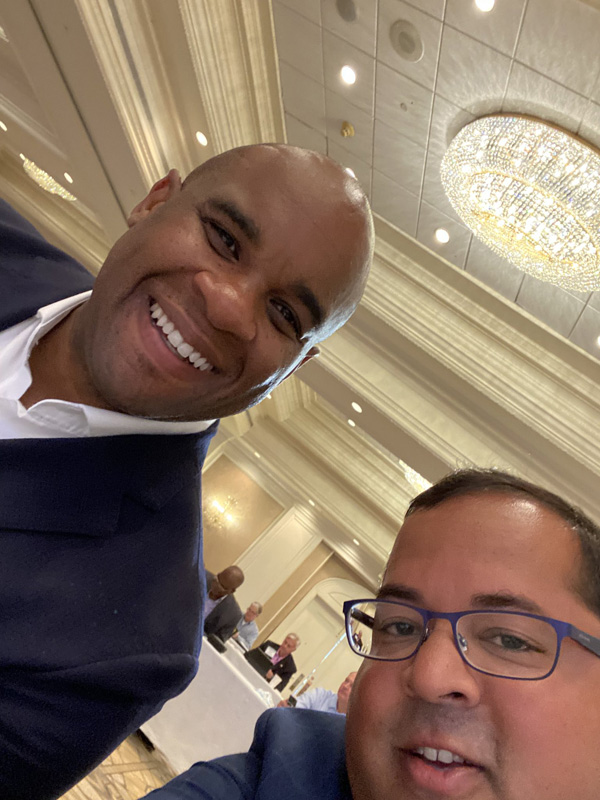
The White House on Thursday announced that President Biden intends to nominate D.C. Public Service Commission Chair Willie Phillips to FERC.
Phillips, a Democrat, would fill the seat previously held by Republican Neil Chatterjee, who departed Aug. 30 after his term ended June 30. Phillips’ term would end June 30, 2026. His confirmation would give FERC a Democratic majority for the first time in Biden’s presidency and until at least 2025 — presuming Chair Richard Glick or Commissioner Allison Clements do not resign before the end of their terms.
“As the Biden administration works to tackle the climate crisis, advance environmental justice and create a clean electricity grid by 2035, FERC will maintain an important role regulating the transmission of carbon-free energy across the country,” the White House said. “As chairman of the Public Service Commission of the District of Columbia, Willie was a thoughtful and innovative leader in modernizing the energy grid, implementing the district’s aggressive clean energy and climate goals, and in protecting the district’s customers.”
Phillips has served on the D.C. PSC since 2014 and was re-nominated and appointed chair in 2018 by Mayor Muriel Bowser. He is also president of the Mid-Atlantic Conference of Regulatory Utility Commissioners. (See Overheard at MACRUC 2021: Pandemic Hardships.)
Prior to becoming a commissioner, he worked at D.C.-based law firm Van Ness Feldman before joining NERC for nearly five years, eventually becoming an assistant general counsel. A native of Alabama, he earned his undergraduate degree from the University of Montevallo and served as deputy press secretary for Sen. Jeff Sessions (R-Ala.) from 2000 to 2002.
Likely a Matter of ‘When,’ not ‘If’
ClearView Energy Partners said Biden’s choice of Phillips was pragmatic and that he is unlikely to face any major opposition in the Senate. It noted that his experience at NERC would likely help him with Republicans, who generally place grid reliability at the forefront of FERC’s responsibilities. His service under Sessions could also help him earn bipartisan points, the analysts said.
“The nomination of Phillips may be a move to recognize that the commission is an independent economic regulator, not an environmental regulator,” ClearView said. “That said, we do expect Phillips to support FERC facilitating the federal policies under development elsewhere in the administration (such as at the Environmental Protection Agency and the Council on Environmental Quality) to facilitate the Biden agenda for an energy transition.”
“I look forward to meeting with Willie Phillips and having him appear before the Senate Energy and Natural Resources Committee,” Sen. Joe Manchin (D-W.Va.), chair of the committee, said in a statement. “Just as I do with each of the nominees that come before the committee, I will carefully examine his record and qualifications to serve in this important role overseeing our federal energy policy.”
Still, ClearView noted that the Senate has a lot on its plate, and that it did not expect Phillips to be seated earlier than November. Along with legislation implementing budget reconciliation, the Senate will likely be focused on yet another battle over the debt ceiling. Treasury Secretary Janet Yellen on Wednesday warned Congress that the U.S. could default on its debt as soon as next month if the ceiling isn’t raised.
Reaction
The choice of a local regulator, particularly one from the PJM footprint, may also be intended to diffuse tension between FERC and the states over controversial matters such as the RTO’s minimum offer price rule.

The National Association of Regulatory Utility Commissioners was particularly enthusiastic about the choice, noting that it believes all FERC commissioners should have state regulatory experience. “We wholeheartedly support the nomination of Chairman Phillips to serve as a FERC member. He possesses extensive knowledge of the critical issues facing regulators today,” Executive Director Greg White said. “There is no doubt that he will apply this balanced, thoughtful approach to his new role as a FERC commissioner.”
The news was met with mostly positive reaction from around the industry. The American Council on Renewable Energy, Advanced Energy Economy, the Solar Energy Industries Association and the Electric Power Supply Association, among many other groups, all released statements congratulating Phillips and urging the Senate to quickly confirm him.
Glick and Chatterjee also congratulated Phillips, with Chatterjee tweeting that “it would be an honor to have him succeed me.”
Environmental organizations, however, were tepid, at best. A coalition of nearly 500 of them had written to Biden and Senate leaders last month encouraging them to appoint “an environmental and energy justice champion” to fill Chatterjee’s seat.
“We’re deeply concerned about whether the new commissioner will be too closely tied to the energy utilities that have put profit above people,” said Jean Su, energy justice director and senior attorney for the Center for Biological Diversity, one of the lead signatories to the letter. “We hope the Senate will ask the tough questions of Mr. Phillips about his commitment to ending FERC’s disastrous status quo so we can finally prioritize environmental and energy justice in our energy policies.”



